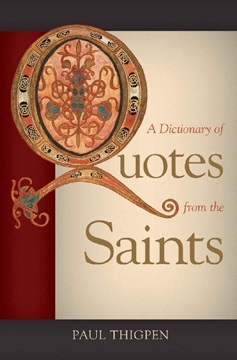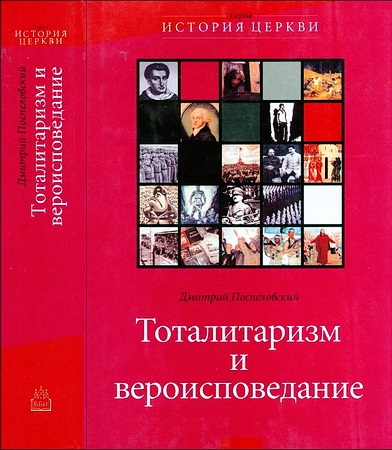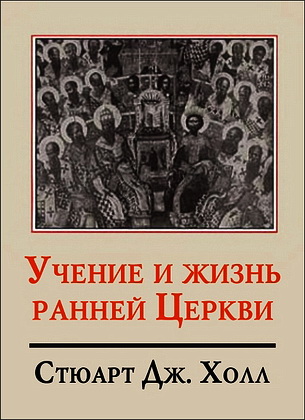
Thigpen - Dictionary of Quotes from the Saints - модуль BibleQuote
Paul Thigpen - Dictionary of Quotes from the Saints
Charlotte, NC: TAN Books, 2001. – 340 p.
ISBN 1505132150
Abba Theodore, a respected abbot among the monks in the deserts of ancient Egypt, once criticized a younger monk as someone who collected the wise sayings of others in order to “retail” them. The abbot’s words challenged me as I began to compile this collection: Was I simply “marketing” the saints’ wisdom for my own purposes?
Then I reread the account of Abba Theodore’s remark and took comfort in the context of his complaint. The other monk, the abbot was noting, concealed the sources of his borrowed sayings and took credit for them himself. This collection, on the other hand, gladly notes the sources, because it is the holy integrity of the saints’ lives that lends such weight to their words and urges us to ponder carefully what they have to tell us.
At the same time, a study of the saints’ lives shows that few of them would or even could take credit themselves for the insights recorded here. From their perspective, originality is not the goal, but rather faithfulness to a tradition: They aim, not to be novel, but to echo authentically the life and wisdom of Christ as these are expressed in a variety of concrete historical circumstances. The striking parallels between quotes from saints who lived in drastically different conditions of time, place, and culture only confirm the repeated insistence of these men and women that truth is one, that wisdom is ancient, that the human condition is universal, and that the way to God is narrow.
Space constraints forced the omission of countless quite similar quotes that would have reflected this reality even more dearly. Instead, I have had to offer a sampling that suggests the “consensus of the saints” across the centuries and around the globe. Quotes are arranged in rough chronological order under each heading as a way of reflecting historical continuity and development.
In the choice of subjects, I tried to include the topics that are fundamental to Christian faith and experience; but the whimsical and even the comical appear here as well—lest we presume that the saints were humorless. Some topics on which the saints often focused, which are nevertheless ignored by our contemporaries, receive considerable attention here as a way of allowing them to rebuke us for our neglect. The result, I trust, is a collection of thoughts that will inspire and provoke, puzzle and comfort, startle and enlighten.
A list of the sources with brief biographical identifiers appears at the end in alphabetical order by first name. This list includes the titles ascribed to these saintly men and women according to their current place in the process of formal canonization—that is, the process by which the Catholic Church comes to recognize officially and publicly that a person has entered into eternal glory in heaven.
When an interested party or group approaches a bishop to advocate that a certain (deceased) candidate be canonized, and the bishop submits a report on that individual to the Congregation for the Causes of Saints, the candidate is first deemed “Servant of God.” Once the congregation verifies that the candidate practiced virtue to a heroic degree or died a martyr’s death, and recommends the cause, if the Holy Father accepts the report the candidate is called “Venerable.” Next, the process of beatification occurs when miracles associated with the candidate during life or after death have been studied and confirmed; the candidate is then called “Blessed.” Finally, the process is complete when the Church fully canonizes the candidate and ascribes the title “Saint,” recommending the person to the universal Church for veneration, imitation, and petition.
Veneration, imitation, and petition: in brief, these are the reasons for producing a dictionary of quotes from the saints, so that the reader can honor them by imitating them and asking their assistance in doing so. My desire is to help you enter more fully into the glorious communion of saints by acquainting you more deeply with these elder brothers and sisters in Christ, to draw you closer to them as friends so that they might draw you closer into their own friendship with God.
* * *
HELL, DAMNATION, THE DAMNED
It is better to be punished and cleansed now than to be sent to the torment to come, when it will be time for punishing only, and not for cleansing.
Gregory Nazianzen
To be lost out of the kingdom of God, to be an exile from the city of God, to be alienated from the life of God, to have no share in that great goodness that God has laid up for those who fear Him and has created for those who trust in Him, would be a punishment so great that, if it were eternal, no torments that we know of, continued through as many ages as man’s imagination can conceive, could be compared with it.
Augustine of Hippo
It is in vain that some, indeed very many, moan about eternal punishment, and the perpetual, uninterrupted torments of the lost, and say they do not believe it will be so. Though they do not blatantly deny Holy Scripture, yet at the suggestion of their own feelings, they soften down everything that seems hard, and give a milder turn to statements that they think are designed to frighten rather than to be received as literally true. … But this perpetual death of the wicked, that is, their alienation from the life of God, will abide forever.
Augustine of Hippo
The damned will be as though always dying and never dead and never going to die. For this reason damnation is described as everlasting death, seeing that just as a dying man is in extreme pain, even so are they who are in hell.
Thomas Aquinas
The regret and anguish of the damned will be useless, for it will not be on account of any hatred for evil, but on account of grief over being punished.
Thomas Aquinas
A man buys hell here with so much pain, that he might have heaven with less than half the amount.
Thomas More
The damned are in the abyss of hell, as within a woeful city, where they suffer unspeakable torments in all their senses and members, because as they have employed all their senses and their members in sinning, so shall they suffer in each of them the punishment due to sin.
Francis de Sales
Hell is full of the talented, but heaven of the energetic.
Jane Frances de Chantal
Lord, I will put myself at hell’s gate, so that I can stop anyone else from entering there.
Dominic Barberi





Комментарии
Пока нет комментариев. Будьте первым!